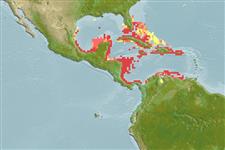>
Mugiliformes (Mullets) >
Mugilidae (Mullets)
Etymology: Joturus: Taken from the Greek letter "iota" = the least or in the very small quantity + Greek, oura = tail (Ref. 45335).
More on author: Poey.
Environment: milieu / climate zone / depth range / distribution range
ນິເວດວິທະຍາ
ສັດທະເລ; ນ້ຳຈືດ; ນ້ຳກ່ອຍ; ກຸ່ມປາຫຼຊະນິດປາທີ່ມີການເຄື່ອນຍ້າຍຈາກແມ່ນ້ຳລົງສູ່ທະເລເພື່ອວ່າງໄຂ່ (Ref. 51243); ລະດັບຄວາມເລິກ 10 - ? m. Subtropical; 22°C - 25°C (Ref. 36880); 30°N - 7°N, 112°W - 65°W
Central America: Bahamas and Greater Antilles and the Atlantic and Pacific slopes of Central America and Colombia.
ຂະໜາດ / ນ້ຳໜັກ / Age
Maturity: Lm ? range ? - ? cm
Max length : 61.0 cm TL ຕົວຜູ້/ບໍ່ມີເພດ; (Ref. 9321); common length : 25.0 cm TL ຕົວຜູ້/ບໍ່ມີເພດ; (Ref. 9321); ນ້ຳໜັກສູງສຸດທີ່ເຄຍຈັດພີມມາ: 3.3 kg (Ref. 40637)
Adults inhabit the upper reaches of rivers but enter brackish waters where spawning probably occurs. An important food fish in some areas. Herbivorous and scrapes algae from stones on the bottom with its fleshy lips, although sometimes eats prawns (Ref. 36880). Oviparous, eggs are pelagic and non-adhesive (Ref. 205). Migrate from the upper reaches of rivers during months of high rainfall to the sea-river transition zone to spawn (Ref. 13802).
Life cycle and mating behavior
ການຈະເລີນເຕັມໄວ | ການສືບພັນ | ການວາງໄຂ່ | ໄຂ່ | ຄວາມດົກຂອງໄຂ່ປາ | ຕົວອ່ອນ
Harrison, I.J., 1995. Mugilidae. Lisas. p. 1293-1298. In W. Fischer, F. Krupp, W. Schneider, C. Sommer, K.E. Carpenter and V. Niem (eds.) Guia FAO para Identification de Especies para lo Fines de la Pesca. Pacifico Centro-Oriental. 3 Vols. FAO, Rome. (Ref. 9321)
IUCN Red List Status (Ref. 130435)
Threat to humans
Harmless
Human uses
ການປະມົງ: ການປະມົງແບບກຸ້ມຕົນເອງ
ຂໍ້ມູນຕື່ມອີກ
ຊື່ສາມັນຄຳສັບຄ້າຍຄືກັນການເຜົາໃໝ້ພະລັງງານໂດຍປ່ຽນທາດອາຫານໃນຮ່າງກາຍໃຫ້ກາຍເປັນຊີ້ນແລະໜັງຜູ້ລ້າການສຶກສາຜົນກະທົບຂອງສານຜິດທີ່ມີຜົນກະທົບຕໍ່ລະບົບນິເວດການສືບພັນການຈະເລີນເຕັມໄວການວາງໄຂ່ການສັງລວມການວາງໄຂ່ຄວາມດົກຂອງໄຂ່ປາໄຂ່Egg development
ເອກະສານອ້າງອີງການລ້ຽງສັດນ້ຳຂໍ້ມູນການລ້ຽງສັດນ້ຳສາຍພັນກຳມະພັນElectrophoresesການຖ່າຍທອດທາງກຳມະພັນຈາກພໍ່ແມ່ຫາລູກພະຍາດການປຸງແຕ່ງNutrientsMass conversion
ຜູ້ຮ່ວມມືຮູບStamps, Coins Misc.ສຽງຫອຍມີພິດຊະນິດນຶ່ງທີ່ອາໄສໃນທະເລຄວາມໄວປະເພດການລອຍເນື້ອທີ່ເຫືອກOtolithsສະໝອງວິໄສທັດ
ເຄື່ອງມື
Special reports
Download XML
ແຫຼ່ງອີນເຕີເນັດ
Estimates based on models
Preferred temperature (Ref.
123201): 27.5 - 28.4, mean 28 °C (based on 223 cells).
Phylogenetic diversity index (Ref.
82804): PD
50 = 1.0000 [Uniqueness, from 0.5 = low to 2.0 = high].
Bayesian length-weight: a=0.01175 (0.00558 - 0.02474), b=2.96 (2.79 - 3.13), in cm total length, based on LWR estimates for this (Sub)family-body shape (Ref.
93245).
ຊັ້ນເຂດຮ້ອນ (Ref.
69278): 2.9 ±0.37 se; based on food items.
ຄວາມຢືດຢຸ່ນ (Ref.
120179): ຂະໜາດກາງ, ປະຊາກອນຕຳ່ສຸດທີ່ໃຊ້ເວລາສອງເທົ່າ 1.4 - 4.4 ປີ (Assuming tm=2).
Fishing Vulnerability (Ref.
59153): Moderate vulnerability (44 of 100).
Climate Vulnerability (Ref.
125649): Very high vulnerability (88 of 100).
Nutrients (Ref.
124155): Calcium = 80.4 [31.3, 190.5] mg/100g; Iron = 1.2 [0.6, 2.7] mg/100g; Protein = 19.4 [17.7, 21.0] %; Omega3 = 0.501 [0.239, 1.087] g/100g; Selenium = 18.3 [9.2, 38.9] μg/100g; VitaminA = 11.5 [3.4, 41.2] μg/100g; Zinc = 1.08 [0.76, 1.61] mg/100g (wet weight);
